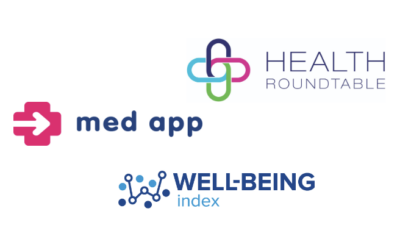In this second blog in our Clinician Wellbeing series, Dr Caitlin Weston discusses the critical role of leadership support for clinician wellbeing through development and implementation of successful programs that address issues leading to mental ill-health for doctors and medical students.
The key to success for any clinician wellbeing program is the “tone at the top”. This reality was evident in the research I completed for the Churchill Fellowship and then documented in Burning out: International Approaches to Clinical Wellbeing. In this article, I touch on the research findings that relate to the role of leadership support for clinician wellbeing programs.
Why is leadership support for clinician wellbeing important?
Perhaps it’s not surprising that “Commitment from executive leadership is the prerequisite, assessment is the first step, and front-line leadership a force multiplier.”2
When I studied the efforts of various individuals and groups who had worked behind the scenes for many years on programs designed to promote clinician wellbeing, one fact stood out: only when executive staff were engaged did things really take off. In fact, once leadership became engaged, organisational structures dedicated to clinician welfare, clear chains of accountability, together with plans for monitoring trends over time all emerged, seemingly overnight. Perhaps what was most encouraging was that, in many cases, the efforts of those who’d already been working in this arena were leveraged and made more visible.
There are many distinguishing characteristics of organisations where leadership is engaged in a program that supports clinician wellbeing, with the following among them:
- Senior medical staff are more open and realistic about the challenges of clinical practice and showed respect for those working to improve things
- A softening of the unhealthy “iron man” culture of medicine, with junior doctors visibly more comfortable to acknowledge difficulties.
So, if leadership involvement is an essential ingredient for the success of any effort to support clinician wellbeing, it follows there must be an understanding about how this can occur most easily.
Leadership support: How best to attain it
It is encouraging to know this question has been the focus of research conducted at the Stanford WellMD Center, with findings corroborated at conferences, such as the American Conference on Physician Health and through my own research.
A common message delivered through all channels was the key to engaging leadership is to “speak to leaders in their language”. This translates as: Develop a compelling business case that reflects the substantial economic impact of burnout. Why? Because although executive leaders are sympathetic to the moral and ethical case for improving wellbeing, they feel the issue is beyond their scope and means to address. Highlighting the potential impact on the bottom line as well as patient safety conveys that making meaningful improvements to clinician wellbeing is not only the right thing to do, but also makes good business sense.
Those who are advocating for change from the ground up in an organisation can start by developing a meaningful business case, as previously stated. They can also:
- Identify the main drivers in the organisation or unit by performing cultural and needs assessments through surveys of front-line clinicians, focus groups, and working group
- Identify strengths and resources already available, engaging frontline staff, and then demonstrating to executive leadership elements needed for change already exist
- Funnel existing services through centralised directories and staff contacts, empowering individuals to access services
- Institute a quality improvement cycle that provides mechanisms for feedback and evaluation of interventions.
How is technology helping with leadership support for clinician wellbeing?
Consistent with recommendations from my report and the federal government’s Every Doctor, Every Setting: A National Framework, steps are being taken to simplify delivery of practical, accessible wellbeing resources for clinicians to be implemented.
Med App is a great example of this. It is an offline-accessible, mobile-first application that provides access to curated internal and external evidence-based wellbeing resources as well as tools that enable clinicians to practice efficiently and with confidence in their professional setting. It is ideal for the hospital environment where clinicians at all career stages may be affected by mental ill-health and require resources to manage their own health and continue providing patient care, and having well-being resources nested within a clinical app helps to normalise well-being as a professional priority.
The MedApps team is supporting 55 of hospitals in Australia and internationally to address the issue of clinician well-being because we recognise that getting this right has the potential to impact patient outcomes and the overall quality of healthcare.
Is your organisation supporting clinician wellbeing? Learn how simple it can be when you download the app* or request a demonstration today? For more information, reach out via email at [email protected].
*Available on the App Store for iOs and Google Play for Android.
- Weston, Caitlin. Burning out: International Approaches to Clinician Wellbeing. The Winston Churchill Memorial Trust, Canberra, 2018.
- Shanafelt, T., J. Goh, and C. Sinsky, The business case for investing in physician well-being. JAMA internal medicine, 2017. 177(12): p. 1826-1832.





0 Comments